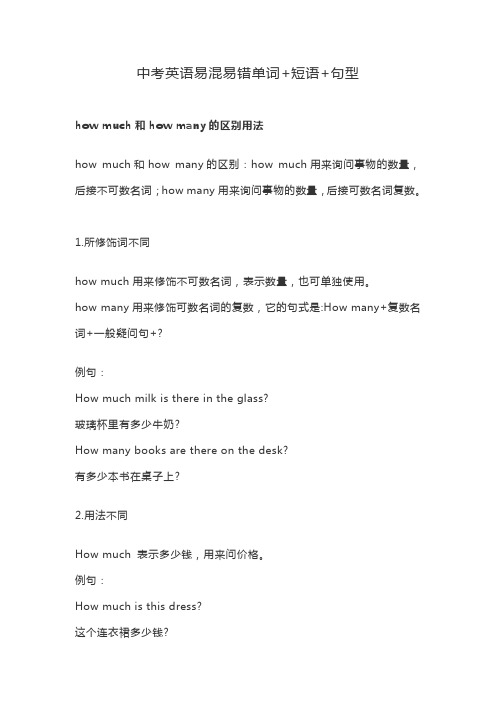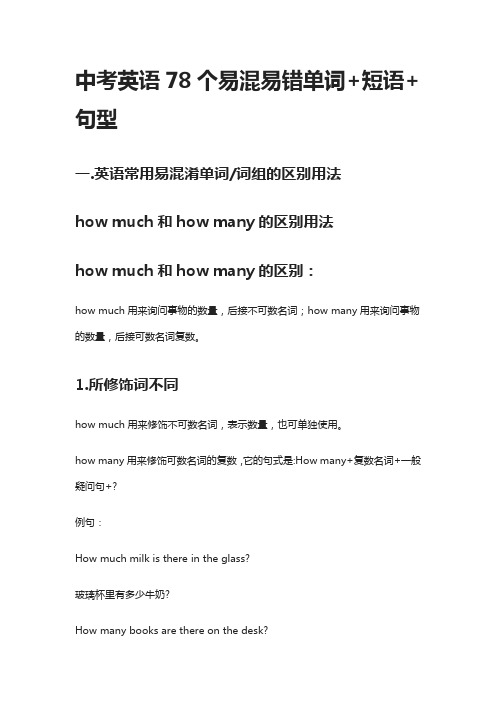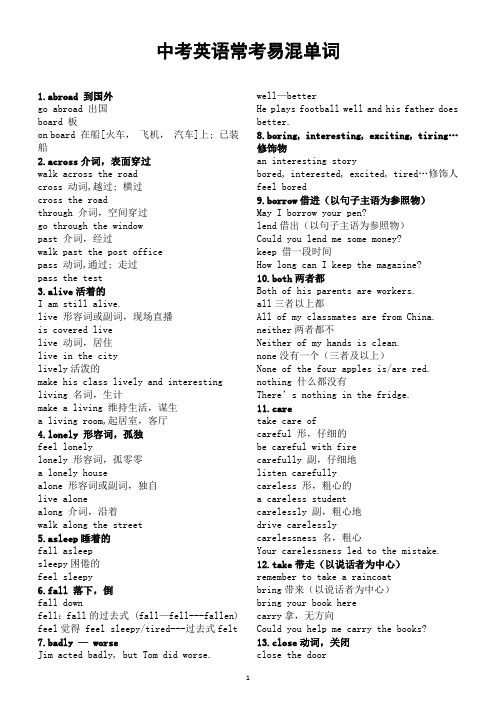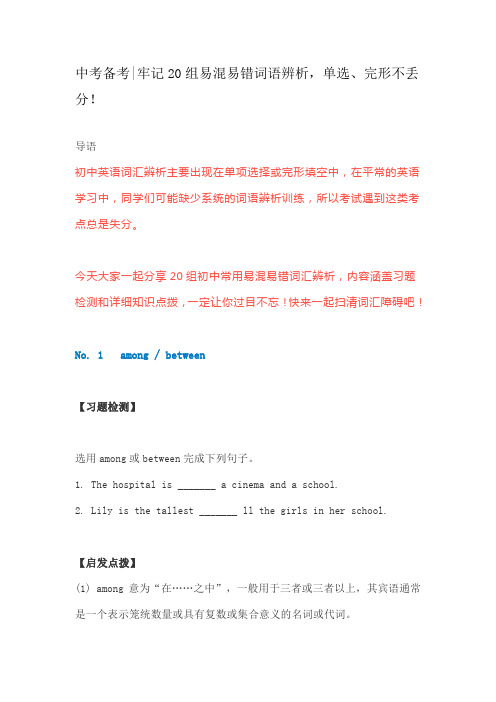中考英语易混词组
中考英语常用易混淆单词词组的区别用法详解

中考英语易混易错单词+短语+句型how much和how many的区别用法how much和how many的区别:how much用来询问事物的数量,后接不可数名词;how many用来询问事物的数量,后接可数名词复数。
1.所修饰词不同how much用来修饰不可数名词,表示数量,也可单独使用。
how many用来修饰可数名词的复数,它的句式是:How many+复数名词+一般疑问句+?例句:How much milk is there in the glass?玻璃杯里有多少牛奶?How many books are there on the desk?有多少本书在桌子上?2.用法不同How much 表示多少钱,用来问价格。
例句:How much is this dress?这个连衣裙多少钱?How many 表示多少,用来问数量。
例句:How many apples do you have?你有多少苹果?in和on的区别用法当我们表示某些东西被其他东西所包围时使用“in”这个词。
而“on”用于描述物体被放置在其他物体上方或外部的情况。
in可表时间,表地点,表手段、方法、材料。
on表示时间、地点、方位等。
1.意思不同in:prep.在... 里;在... 地方;在... 期间on:prep.在... 之上2.用法不同in:in着重一段时间的过程,常用于重复动作或延续动作。
in表示从现在时间算起推移到将来的一段时间之后,一般与将来时态连用。
例句:He is a layman in economics.他对经济学一窍不通。
on:表示“在物体的表面上”,只能用on的表达方式有on the next morning,on the following。
例句:The spider is walking on the ceiling.蜘蛛在天花板上爬行。
3.侧重点不同in:表示“在其中”。
on:表示“在表面”。
英语中考常考易混词汇辨析(G-M)

2022 中考常考易混词汇辨析(G-M开头)(配练习+答案)9. jeans/ trousers / pants/ shoes 等成双成对的词的主谓一致问题10. 【参加】的词组Practice1. The sun is shining. Don't look at the sun.A.gold; straightB.golden; straightlyC.golden; straightD.gold; straightly2. —Do you come from ?—No. But I can speak well.A.Germany; GermanB.German; GermanyC.Germany; GermanyD.German; German3. Students will make progress if they a subject.A.be made ofB.be made fromC.be made up ofD.be made in4. The kite is paper, and the paper is trees.A.made of; made fromB.made from; made ofC.made of; made inD.made from; made in5. It's getting dark, let's , shall we?A.go on to workB.go on workingC.to go on workD.to go on working6. Students to study. Their parents to pick them up.A.go to the school; go to the schoolB.go to school; go to schoolC.go to the school; go to schoolD.go to school; go to the school7. Boys and girls, time is up, please check your name and your papers.A.hand outB.hand upC.hand inD.hand down8. The hunter the fox, took off its skin and it on the tree.A.hung; hangedB.hung; hungC.hanged; hangedD.hanged; hung9. Our teacher often tells us different events that have strong influence on China.A.historic; historyB.historical; historicC.history; historyD.history; historic10. In order to have a better understanding of those places of interest, she read some books before the visit.A.historical; historicalB.historical; historicC.historic; historicalD.historic; historic11. Why don't you us to the speech contest?A.join; joinB.take part in; take part inC.take part in; joinD.join; take part in12. A is a long journey on a ship or in a spacecraft.A.tourB.voyageC.tripD.continent13. The boy's mother is . He has to look after his mother at home.A.bad; sickB.ill; badC.ill; sickD.sick; ill14. This year's Government Work Report many issues economic growth, environmental protection, etc.A.includes; includingB.include; includingC.is included; includeD.including; include15. Thousands of people lost their in the earthquake, so we should value our daily .A.lives; lifeB.life; lifeC.lives; livesD.life; lives16. Independence does not mean (shut)the door to the world.本章答案1-5 BACAB 6-10 DCDDC 11-15 DBCAA 16. shutting。
中考英语78个易混易错单词+短语+句型(全)

中考英语78个易混易错单词+短语+句型一.英语常用易混淆单词/词组的区别用法how much和how many的区别用法how much和how many的区别:how much用来询问事物的数量,后接不可数名词;how many用来询问事物的数量,后接可数名词复数。
1.所修饰词不同how much用来修饰不可数名词,表示数量,也可单独使用。
how many用来修饰可数名词的复数,它的句式是:How many+复数名词+一般疑问句+?例句:How much milk is there in the glass?玻璃杯里有多少牛奶?How many books are there on the desk?有多少本书在桌子上?2.用法不同How much 表示多少钱,用来问价格。
例句:How much is this dress?这个连衣裙多少钱?How many 表示多少,用来问数量。
例句:How many apples do you have?你有多少苹果?in和on的区别用法:当我们表示某些东西被其他东西所包围时使用“in”这个词。
而“on”用于描述物体被放置在其他物体上方或外部的情况。
in可表时间,表地点,表手段、方法、材料。
on表示时间、地点、方位等。
1.意思不同in:prep.在 ... 里;在 ... 地方;在 ... 期间on:prep.在 ... 之上2.用法不同in:in着重一段时间的过程,常用于重复动作或延续动作。
in表示从现在时间算起推移到将来的一段时间之后,一般与将来时态连用。
He is a layman in economics.他对经济学一窍不通。
on:表示“在物体的表面上”,只能用on的表达方式有on the next morning,on the following。
The spider is walking on the ceiling.蜘蛛在天花板上爬行。
3.侧重点不同in:表示“在其中”。
中考易混清词汇unusual

中考易混清词汇unusual中考英语考试中,经常会涉及一些词汇的辨析,有些单词很相似,容易混淆。
本文将重点介绍一组常见的易混清词汇——"unusual","ordinary"以及"unique"。
希望通过本文的解析,能够帮助大家更好地理解和运用这些词汇。
一、unusual"unusual"是一个形容词,意思是“不寻常的”或者“罕见的”。
它用来描述与平常不同的、不寻常的事物或情况。
当我们遇到一些不同于日常经历的事情时,我们可以使用"unusual"这个词。
比如,一个在街上戴着奇特帽子的人,我们可以说他穿着不寻常。
再比如,突如其来的雨雪是一个不寻常的天气现象。
二、ordinary"ordinary"也是一个形容词,意思是“普通的”或者“常见的”。
它用来描述那些我们日常生活中接触最多的事物和情况。
与"unusual"相比,"ordinary"强调的是符合常规、常见的特点。
比如,我们每天都会见到普通的公交车,普通的食物,这些都属于ordinary事物。
三、unique"unique"同样是一个形容词,意思是“独特的”或者“独一无二的”。
它用来形容那些独一无二的事物,与其他事物不同。
与"unusual"相比,"unique"更加强调某个事物的独特性,指的是只有一个或者很少几个。
比如,著名画家达·芬奇的画作就是unique的,因为没有人能够完全复制他的作品。
在使用这些词汇的时候,我们需要注意它们的搭配和用法。
比如,我们可以说一个人的外表很unusual,但不可以说他很unique,因为unique的意思是"独一无二的",用来形容事物而不是人。
另外,我们可以说一个事物是ordinary和unusual的,但不可以说它是ordinary和unique的,因为这两个词意思相对矛盾。
初中英语2024届中考复习常考易混单词和短语

中考英语常考易混单词1.abroad 到国外go abroad 出国board 板on board 在船[火车,飞机,汽车]上; 已装船2.across介词,表面穿过walk across the roadcross 动词,越过; 横过cross the roadthrough 介词,空间穿过go through the windowpast 介词,经过walk past the post officepass 动词,通过; 走过pass the test3.alive活着的I am still alive.live 形容词或副词,现场直播is covered livelive 动词,居住live in the citylively活泼的make his class lively and interesting living 名词,生计make a living 维持生活,谋生a living room,起居室,客厅4.lonely 形容词,孤独feel lonelylonely 形容词,孤零零a lonely housealone 形容词或副词,独自live alonealong 介词,沿着walk along the street5.asleep睡着的fall asleepsleepy困倦的feel sleepy6.fall 落下,倒fall downfell:fall的过去式 (fall—fell---fallen) feel觉得 feel sleepy/tired---过去式felt 7.badly — worseJim acted badly, but Tom did worse. well—betterHe plays football well and his father does better.8.boring, interesting, exciting, tiring…修饰物an interesting storybored, interested, excited, tired…修饰人feel bored9.borrow借进(以句子主语为参照物)May I borrow your pen?lend借出(以句子主语为参照物)Could you lend me some money?keep 借一段时间How long can I keep the magazine?10.both两者都Both of his parents are workers.all三者以上都All of my classmates are from China. neither两者都不Neither of my hands is clean.none没有一个(三者及以上)None of the four apples is/are red. nothing 什么都没有There’s nothi ng in the fridge.11.caretake care ofcareful 形,仔细的be careful with firecarefully 副,仔细地listen carefullycareless 形,粗心的a careless studentcarelessly 副,粗心地drive carelesslycarelessness 名,粗心Your carelessness led to the mistake. 12.take带走(以说话者为中心)remember to take a raincoatbring带来(以说话者为中心)bring your book herecarry拿,无方向Could you help me carry the books?13.close动词,关闭close the doorclose 形容词,亲密的my closest friendclosed形,关着的keep the door closed14.closely副,密切地work closely with us15.brave形,勇敢的He is brave enough to save the old man. courage 名,勇气have the courage to tell him the bad news bravely 副,勇敢地face the difficulties bravely16.dead形容词,死的have been deaddie动,死亡die of hungerdeath名,死亡the death of his pet makes him so sad. 17.especially副,尤其He is good at all subjects, especially maths.specially副,专门The pen is specially designed for the boy. special形,特殊的a special day18.except除了All the students except Tom will go for a school trip.expect期待You are expected to bring it back when you return.19.excited形,激动的,修饰人feel excitedexciting形,激动人心的,修饰物an exciting filmexcitedly 副词,修饰动画shouted excitedlyexcitement名词shout with excitement20.a little一些,修饰不可数名词a little moneya few一些,修饰可数名词a few treeslittle几乎没有,修饰不可数名词There’s little water in the glass, is it? few几乎没有,修饰可数名词so few students21.form 形成form a good reading habitfrom 从……22.France法国/ French 法语German德国的/ Germany 德国23.hard努力work hardhardly几乎不The boy hardly does his homework.24.healthy健康的keep healthyhealth健康it’s good for your healthhealthily健康地eat healthily25.if如果主将从现If he comes, I’ll call you.是否I don’t know if he will come here. whether是否(如与or连用,则用)I wonder whether he’ll come or not. weather 天气What will the weather be like tomorrow?26.include 动词,包括The list includes the names of many famous writers.including 介词,包括They have many pets, including three cats.27.invent动词发明Edison invented a lot of things. invention名词发明The invention made much difference to humans.inventor名词发明者Edison was a great inventor.st 上一个的last year;最后的make her last apperance动词,持续The meeting will last one and a half hours. lasting 形,持久的a lasting value29.lie名词,谎言tell a lie动词,说谎He is always lying to us.动词,位于Japan lies to the east of China.动词,躺,平放He likes lying on the grass.躺,平放;位于:lie—lay---lain说谎:lie-lied-lied30.luck名,运气good lucklucky 形,幸运的a lucky numberluckily 副,幸运的是Luckily, we got better marks.unlucky/unluckily31.noise名,噪音Don’t make any noise.noisy 形,吵闹的much too noisynoisily 副,吵闹地talk noisily32.noise 名词,噪音sound 名词,声音We sat listening to the sound of the waves sound 动词,听起来The music sounds beautiful.voice 名词,嗓音The singer has a sweet voice.33.provide提供provide a chance for the boy=provide the boy with a chanceoffer 提供offer a chance to the boy=offer the boy a chance34.other别的,加名词other studentsanother另一个I don’t like the pair of shoes, would you like to show me another pair?the other 两个中的另一个,常用one…the otherHere is a shoe, where’s the other one? others= other+名词35.over/ under年龄的上下above/ below温度,楼层的上下36.peace名词,和平love peacepeaceful形,宁静的a peaceful villagepeacefully 副,和平地we hope to solve the problem peacefully.37.pleasure名,乐意。
英语中考牢记20组易混易错词语辨析

中考备考|牢记20组易混易错词语辨析,单选、完形不丢分!导语初中英语词汇辨析主要出现在单项选择或完形填空中,在平常的英语学习中,同学们可能缺少系统的词语辨析训练,所以考试遇到这类考点总是失分。
今天大家一起分享20组初中常用易混易错词汇辨析,内容涵盖习题检测和详细知识点拨,一定让你过目不忘!快来一起扫清词汇障碍吧!No. 1 among / between【习题检测】选用among或between完成下列句子。
1. The hospital is _______ a cinema and a school.2. Lily is the tallest _______ ll the girls in her school.【启发点拨】(1) among意为“在……之中”,一般用于三者或三者以上,其宾语通常是一个表示笼统数量或具有复数或集合意义的名词或代词。
(2) between一般指两者之间,其宾语通常是表示两者概念的名词或代词,或由and连接的两个具体的人或物。
between有时也可表示多者之中的“两两之间”。
如:Switzerland lies between France, Germany, Austria and Italy.Key:1. between2. amongNo. 2 lay / lie【习题检测】用lay或lie的适当形式完成句子。
1. I _______ the table when my mother cooked the meal.2. John was ill and _______ in bed all morning.【启发点拨】(1) lay作动词,可意为“摆放(餐桌)”,其过去式与过去分词均为laid,现在分词为laying,常用于短语lay the table,意为“摆放餐桌”。
如:Tom was laying the table.(2) lie作动词,意为“躺;平躺”时,过去式为lay,过去分词为lain,现在分词为lying。
中考英语最易混淆词汇汇总
中考英语最易混淆词汇汇总1. clothes, cloth, clothingclothes统指各种衣服,谓语动词永远是复数, cloth指布,为不可数名词clothing 服装的总称,指一件衣服用a piece of, an article of2. incident, accidentincident指小事件, accident指不幸的事故He was killed in the accident.3. amount, numberamount后接不可数名词, number后接可数名词 a number of students4. family, house, homehome 家,包括住处和家人,house房子,住宅,family家庭成员. My family is a happy one.5. sound, voice, noisesound自然界各种各样的声音,voice人的嗓音,noise噪音I hate the loud noise sutside.6. photo, picture, drawingphoto用照相机拍摄的照片,picture可指相片,图片,电影片,drawing画的画Let's go and see a goodpicture.7. vocabulary, wordvocabulary词汇,一个人拥有的单词量,word具体的单词He has a large vocabulary.8. population, peoplepopulation人口,人数,people具体的人 China has a large population.9. weather, climateweather一天内具体的天气状况,climate长期的气候状况The climate here is not good for you.10. road, street, path, wayroad具体的公路,马路,street街道,path小路,小径, way道路,途径take this road; in the street, show me the way to the museum.11. course, subjectcourse课程(可包括多门科目),subject科目(具体的学科)a summer course12. custom, habitcustom传统风俗,习俗,也可指生活习惯,后接to do, habit生活习惯,习惯成自然,后接of doing. I've got the habit ofdrinking a lot.13. cause, reasoncause 指造成某一事实或现象的直接原因,后接ofsth./doing sth,reason用来解释某种现象或结果的理由,后接for sth./doing sth. the reason for being late14. exercise, exercises, practiceexercise运动,锻炼(不可数),exercises练习(可数), practice(反复做的)练习 Practice makesperfect.15. class, lesson作"课"解时,两者可以替换.指课文用lesson. 指班级或全体学生用class. lesson 6; class 516. speech, talk, lecturespeech指在公共场所所做的经过准备的较正式的演说,talk日常生活中的一般的谈话,讲话,lecture学术性的演讲, 讲课 a series of lecture on…17. officer, officialofficer部队的军官,official政府官员 an armyofficer18. work, job二者均指工作。
初中英语中考常用介词短语和易混易错词组
初中英语中考常用介词短语和易混易错词组英语中的介词短语是初中英语中比较基础的语法知识,因为只要掌握了基础介词短语的使用,便可以较为自然地进行句子构造和语言表达。
但是,介词短语很容易出现易混淆的情况,所以在中考中要特别注意。
本文将介绍一些中考常出现的介词短语和易混淆的词组。
1. on time vs in time这两个短语都有“准时”的意思,但是它们的用法不一样。
On time多指某种交通工具或者开会等事情仍在规定的时间内,而in time 则强调在最后期限内完成某件事情。
例如,We arrived at the airport on time(我们按时间到达了机场);He finished his homework just in time(他及时完成了作业)。
2. according to vs in accordance with这两个短语都表示“按照……”,但是according to后面接的是某个具体的规定或者价值观念,而in accordance with则强调是根据某个标准或者制度来做某件事情。
例如,According to the survey,more and more people prefer to work from home(根据调查,越来越多的人喜欢在家工作); In accordance with company regulations, smokers may only smoke in designated areas(根据公司规定,吸烟者只能在指定区域吸烟)。
3. in spite of vs despite这两个短语都表示“尽管”,但in spite of通常用来表示困难或者阻力,而despite则强调不受阻碍的情况。
例如,In spite of the heavy rain, we still went hiking(尽管下着大雨,我们还是去远足了);Despite the fact that he was tired, he continued to work(尽管很累,他还是继续工作)。
中考英语必备易混单词
中考英语必备:151个易混单词1) quite相当quiet 安静地2) affect v 影响,假装 effect n 结果,影响3) adapt 适应 adopt 采用 adept 内行4) angel 天使 angle 角度5) dairy 牛奶厂 diary 日记6) contend 奋斗,斗争 content 内容,满足的 context 上下文 contest 竞争,比赛7) principal 校长,主要的 principle 原则8) implicit 含蓄的 explicit 明白的9) dessert 甜食 desert 沙漠 v 放弃 dissert 写论文10) pat 轻拍 tap 轻打 slap 掌击 rap 敲,打11) decent 正经的 descent n 向下,血统 descend v 向下12) sweet 甜的 sweat 汗水13) later 后来 latter 后者 latest 最近的 lately adv 最近14) costume 服装 custom 习惯15) extensive 广泛的 intensive 深刻的16) aural 耳的 oral 口头的17) abroad 国外 aboard 上(船,飞机)18) altar 祭坛 alter 改变19) assent 同意 ascent 上升 accent 口音20) champion 冠军 champagne 香槟酒 campaign 战役21) baron 男爵 barren 不毛之地的 barn 古仓22) beam 梁,光束 bean 豆 been have 过去式23) precede 领先 proceed 进行,继续24) pray 祈祷 prey 猎物25) chicken 鸡 kitchen 厨房26) monkey 猴子 donkey 驴27) chore 家务活 chord 和弦 cord 细绳28) cite 引用 site 场所 sight 视觉29) clash (金属)幢击声 crash 碰幢,坠落 crush 压坏30) compliment 赞美 complement 附加物31) confirm 确认 conform 使顺从32) contact 接触 contract 合同 contrast 对照33) council 议会 counsel 忠告 consul 领事34) crow 乌鸦 crown 王冠 clown 小丑 cow 牛35) dose 一剂药 doze 打盹36) drawn draw 过去分词 drown 溺水37) emigrant 移民到国外 immigrant 从某国来的移民38) excess n 超过 exceed v超过 excel 擅长39) hotel 青年旅社 hostel 旅店40) latitude 纬度 altitude 高度 gratitude 感激41) immoral 不道德的 immortal 不朽的42) lone 孤独的 alone 单独的 lonely 寂寞的43) mortal 不死的 metal 金属 mental 神经的 medal 勋章 model 模特meddle 玩弄44) scare 惊吓 scarce 缺乏的45) drought 天旱 draught 通风,拖拉 draughts (英)国际跳棋47) assure 保证 ensure 使确定 insure 保险48) except 除外 expect 期望 accept 接受 excerpt 选录 exempt 免除49) floor 地板 flour 面粉50) incident 事件 accident 意外51) inspiration 灵感 aspiration 渴望52) march三月,前进 match比赛53) patent专利potent有力的potential潜在的54)police警察policy政策 politics政治55) protest抗议protect保护56) require需要 inquire询问enquire询问 acquire获得67)revenge 报仇avenge 为……报仇68) story故事storey 楼层 store商店69)strike打stick坚持strict严格的70)expand 扩张expend花费 extend延长71) commerce商业commence开始72) through通过thorough彻底的(al)though尽管thought think 过去分词73) purpose目的suppose假设propose 建议74) expect期望respect尊敬 aspect方面 inspect视察suspect 怀疑75)glide滑翔slide使滑行 slip跌落76)steal偷 steel钢77) strive努力stride大步走78) allusion暗示illusion 幻觉 delusion错觉 elusion逃避79)prospect 前景 perspective透视法80) stationery文具stationary 固定的81)loose 松的lose丢失loss n 损失 lost lose过去式82)amend 改正,修正emend校正83)amoral unmoral immoral同义不道德的84)capitol大厦 capital首都85)casual随便的causal表原因的86)extend 延伸extent 长度extant现存的87) inability没能力disability残疾88)personnel 人事personal 个人的89) statue塑像statute 法令 stature身长status 地位90)widow寡妇window窗户91)socks短袜 stockings长筒袜92) tax税taxi出租93) definite不定的infinite 无限的94) grim严酷的grime污点95)crayon蜡笔canyon 山谷96) recent最近resent生气97)phrase短语phase阶段98) mission使命emission 散发,发射mansion 大厦99) vision视觉 version译本100)gasp上气不接下气 grasp抓住101)delicate微妙的dedicate献身101) idle空闲的idol 偶像102)induce促使,劝诱deduce 推测reduce减少seduce 诱使103)lapse 流逝 elapse消逝eclipse 日食104)rude粗鲁的crude天然的105)source水源sauce 酱油saucer茶托resource资源 recourse求援106) sled(儿童)雪橇 sledge雪橇107) stripe条纹 strip条trip旅行108)vocation职业vacation假期evocation召集revocation 撤回109)ardor热情 adore崇拜adorn 装饰110)area区域era 时代111) resemble象…… assemble v 集合,装配assembly n 集合,装配112)assume假定resume恢复113)attain 达到obtain 获得 abstain放弃114) award授予reward 奖赏115) baggage(American English)luggage行李116)badge徽章bandage绷带117)blade刀刃bald 秃的bold大胆118) bloom开花blossom 开花(结果实) bosom胸口119)blush脸红 flush发红(脸)120)bride新娘 bribe贿赂121) growl咆哮howl狼叫122) depress使沮丧suppress镇压oppress 压迫123) dime一角dim暗淡的124)dizzy眼花缭乱 dazzle使眼花125) brown褐色brow眼眉blow打击126) bullet子弹bulletin公告127)carton 纸板盒 cartoon动画128)chivalry骑士精神cavalry骑兵队129) collar领子 cellar地窖color颜色130) vanish消失evanish使消失131) intrude入侵extrude 逐出detrude推下132) contort 扭弯distort 弄弯retort反驳133)eminent 杰出的 imminent逼近的134) decline下降recline放置 incline倾斜135) exclaim呼喊proclaim宣布acclaim欢呼declaim朗诵136)edict法令indict控告137) perfuse泼洒 profuse 浪费的138)reject 拒绝eject逐出inject注射deject使沮丧139)literacy识字literary 文学的literature文学literal文字的140)median中央的,中线的 medium 媒体141) expel驱逐repel反击impel推动 dispel驱散142) rip撕ripe熟的143) wench绞车 wrench扭伤144)confidant 知己confident有信心的145) dine吃饭diner吃饭人 dinning n 吃饭dinner晚饭146)dreg渣滓drag拖拉147)faint失去知觉feint佯攻148) imprudence 轻率 impudence无耻149)specie硬币species种类150) hanger钩子 hangar棚厂hunger饥饿151)suite 一(套,批)suit一套衣服。
中考英语几个高频词及词组
中考英语高频词与词组初中英语有许多易混的词和词组,且是高频考点,这里整理一些相关内容,供参考。
1 take, spend, pay, cost 花销;花费Take:记住一个句型:It takes ( somebody)+时间+to do something.记住这个句型,就已经掌握了take的这个用法。
例:It took me five days to get there. 我花了五天时间才到那。
Spend: 主语是人,宾语是时间或金钱。
句型:Somebody spend(s) +时间/金钱+ on something/ (in) doing something. 这里的in 可以省略。
例:He spent the whole night playing games. 他整晚玩游戏。
Pay:主语是人,宾语是金钱。
句型:Somebody pay(s) +金钱+ for something . 注意这里是for.例:She paid 100 yuan for the shirt. 她花了100元买这件衬衫。
Cost:主语是物,宾语是人。
句型:something cost(s) somebody +时间/金钱。
例:This book cost me 100 yuan. 这本书花了我100元。
2 aloud, loud, loudly 大声的(地)Aloud:副词,大声地。
指为了让别人能听到的大声。
例:My father asked me to sing aloud to him. 我父亲让我大声唱歌给他听。
Loud:形容词/副词,大声的/地。
固定用法:in a loud voice. 大声地。
常用法:loud enough, as loud as , too loud, so loud, very loud.例:Don’t play the radio so loud. 收音机别放那么大的声音!Loudly:喧闹地,大声地。
- 1、下载文档前请自行甄别文档内容的完整性,平台不提供额外的编辑、内容补充、找答案等附加服务。
- 2、"仅部分预览"的文档,不可在线预览部分如存在完整性等问题,可反馈申请退款(可完整预览的文档不适用该条件!)。
- 3、如文档侵犯您的权益,请联系客服反馈,我们会尽快为您处理(人工客服工作时间:9:00-18:30)。
2014年中考英语易混词组、短语辨析
§1 a bit/ a little
这两个词都意为“一点儿”有时可以互换,但有时不能。
Ⅰ.二者作程度副词修饰形容词、副词、动词或比较级时,意义相同,为“一点儿”“有些”。
如:
①I am a bit / a little hungry. 我有点饿。
②He walked a bit / a little slowly. 他走路有点慢。
Ⅱ.二者都可以作名词词组,充当主语或宾语。
如:
① A little / bit is enough for me. 我有一点儿就够了。
②I know only a little / a bit about her. 我对她的情况只了解一点。
Ⅲ.a little可直接修饰名词; a bit后须加of才可以。
如:
①. There is a little water in the bottle. = There is a bit of water in the bottle. [注意] a little of 后的名词通常特指,表“……中的一些”,如:①May I have a little of your tea?
Ⅳ. 否定形式not a little 作状语,相当于very/ quite, “很”,“非常”;作定语和宾语时,相当于much, 意为“许多”。
而not a bit 作状语时,相当于not at all, 意为“一点也不”,作宾语时则相当于not much. Eg:
①He is not a little (=very) hungry. 他饿极了。
②He is not a bit (=not at all) hungry.他一点也不饿。
③She ate not a little (=much). 她吃得很多。
Ⅴ. Not a bit 中的not 可以分开使用;not a little中的not 则不能分开。
Eg:
①He felt not a bit tired. = He didn’t feel a bit tired. 他觉得一点也不累。
②He felt not a little tired. 他觉得非常累。
但不能说:He didn’t fell a little tired.
§2 a few/ few/ a little/ little
Ⅰ. a few和few修饰可数名词, a little和little修饰不可数名词; a few和a little表示肯定意义,few和little表示否定意义,可受only修饰。
如:
①Few people will agree to the plan because it’s too dangerous.
②This text is easy to understand though there are a few new words in it.
③There is little water left in glass. Will you please give me some ④Don’t worry, we have a little time left.
§3 agree with/ agree on/ agree to
(1)agree with(sb.)表示“与……意见一致”。
I don’t agree with you. 我不同意你的意见。
(2)agree to(sth.)宾语一般为suggestion、plan等,“同意计划、安排”。
(3)We all agreed to your plan. 我们同意你的计划。
(4)(3)agree on 表示“双方就...达成一致协议”。
China and the U.S.A. agreed on the place and time for the next meeting.
中美双方就下次会议的时间、地点问题达成了协议。
§4 at times / at all times / all the time
Ⅰ. at times “不时;偶尔”如:
①The tide is , at times, very high. 潮水有时涨得高。
②I make mistakes at times when I speak English. 我说英语偶尔会出错。
Ⅱ. at all times.“随时;任何时候;总是”如:
He has a cool head at all times. 他随时都有清醒的头脑。
